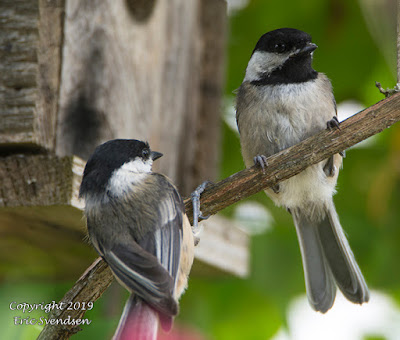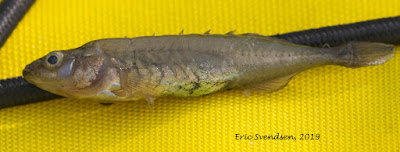Killer cat causes catastrophic carnage of chicks.
 |
| This pair of chickadees just lost their chicks, thanks to a cat raiding the nest. |
It was the other day when I noticed a black cat perched atop my arbor, just behind the birdhouse. I wrote a blog on this (click here) regarding my fears about the future wellbeing of the fine feathered family. My worst fears were realized when, two days ago, I found the bodies of the two young birds on the ground. They had been ravaged, by a cat I'm sure, and their demise led me down a dark path of loathing for the clawed killers. Even worse, they were not eaten due to a state of hunger of the feline predator, they were simply killed and left to rot.
I recognize that nature is both wonderful and barbaric; the young, sick, and old die to become fodder for carnivores on the next trophic level. Yet, this has been the basis for producing a strong population and is one of the core tenets for natural selection. The barbarity has a function; it transfers energy up the food chain and keeps the prey population healthy. But this is different. Cats are not native here, certainly not domesticated ones anyways, their wanderings and destructive tendencies are no better than invasive species like bullfrogs, starlings, and the ever loved Norway rat.
I expect that I have created a shock of horror on the faces of any cat-lovers out there. Consider the facts though. Cats are responsible for the death of over 2 billion (2,000,000,000) birds every year in North America alone. They cause more fatalities than any other single factor. Then there are the diseases they spread. Toxoplasmosis can be transmitted by a cat to a pregnant mother-to-be, resulting in birth defects or even miscarriage. What's more, cats are the only animal which can transmit this disease through their stools. Where do cats like to do their business - fresh soil is perfect. Cat defecates in soil, a pregnant lady works the soil with her hands, the disease transmits to the lady, and the baby is born with a host of problems ranging from cerebral palsy or pneumonia to blindness or even death.
I do not wish for the prohibition of these animals, after all, they benefit us in many ways. Besides the love and affection we get from them, there is their vermin dispatching skill which, unfortunately, are too often directed towards birds. As a family pet, I can vouch for their value. We could have the same conversation for the dog though. Except that dogs have to be on a leash when outside or kept in a fenced yard.
I have not seen too many fences which will deter a cat from finding freedom. You could declaw a cat, but I am hearing that raucous loathing being uttered by feline fanciers again. So, the only solution in my mind is to insist that cats be kept indoors, or be kept on a leash when not in the home. You may disagree with my conclusion, but I think it is equitable and reasonable. You can ask the chickadees in my birdhouse; they think the same thing.


Comments
Post a Comment